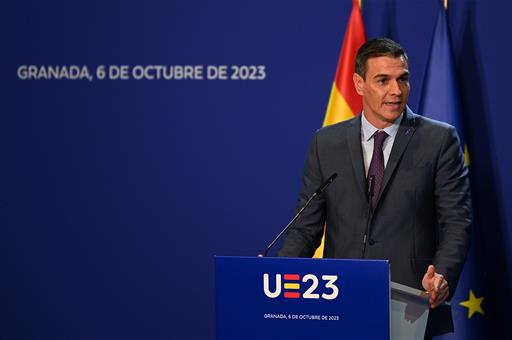Informal European Council
Pedro Sánchez stresses after the summit that Granada will be forever linked to the debates that will mark the future of Europe
President's News - 2023.10.6
Congress Palace, Granada
The acting President of the Government of Spain, Pedro Sánchez, highlighted the legacy of the Granada summit, stressing that this informal meeting of heads of state and government had been decisive in launching the debate on matters of importance for the future of Europe, such as the enlargement of the EU, the redesign of its industrial and trade policy, and progress towards a common migration and asylum policy.
Today in Granada, the EU27 agreed on a common vision on issues of great importance, such as the economic model of the EU, the specific challenges posed by the enlargement of the EU, the migration issue and the situation in Ukraine. With regard to the economic model, European leaders agree on the need to strengthen the competitiveness of European industry.
On the subject of migration, the acting President of the Government welcomed the fact that European leaders reached an agreement last Wednesday on the Crisis Regulation, an important step towards approving a new Pact on Migration and Asylum, and one of the priorities of the Government of Spain during its rotating presidency of the EU Council. Both the President of the European Commission, Ursula von der Leyen, and the President of the Council, Charles Michel, have today publicly acknowledged the work carried out by the Spanish presidency to make progress on the migration dossier. Indeed, this regulation will make it possible to manage migratory flows arriving on European shores in a more equitable, humane and efficient manner. Despite all the differences, European leaders agree on the need to invest more and more sustainably in countries of origin and transit, and to combat the mafia groups that traffic migrants.
Pedro Sánchez highlighted the progress made on the EU's strategic agenda, and recalled Spain's contributions, referring to Resilient EU2030, the Spanish proposal drawn up by the Government of Spain's National Foresight and Strategy Office. As President Sánchez reiterated, this report is the outcome of a pioneering foresight research project that has lasted nearly a year, involving more than 250 experts and 80 ministries from the 27 member states. Focusing on strengthening open strategic autonomy and reinforcing the EU's global leadership in sectors such as energy, health and food, this work identifies concrete goods, services and technologies where the EU could and should strengthen its industries by 2030.
With regard to EU enlargement, this Informal Council leaves behind a major decision: to help the candidate states speed up their reforms to meet the accession criteria. The 27 also agreed on the need to reform the EU itself, to adapt its institutions and to reformulate some of its policies so that the incorporation of these new countries is beneficial for the current member states and, in short, to promote efficiency and agility in decision-making.
The EU27 also returned to the situation in Ukraine, reiterating the EU's commitment to freedom, sovereignty and democracy.
"The name of Granada will now be forever linked to very important declarations of the present and future of Europe", summarised the acting President of the Government. The Granada declaration has opened the debate on the EU of the future, with a strategic vision, and lays the foundations for a more prosperous, competitive and cohesive Europe.
Non official translation
More Info
- The Granada declaration
- Pedro Sánchez at the Granada summit reiterates the importance of strengthening, modernising and revitalising all multilateral institutions (2023/10/05)
- President Sánchez meets with Zelenski in Granada and reiterates Spain's support for a just and lasting peace in Ukraine (2023/10/05)





